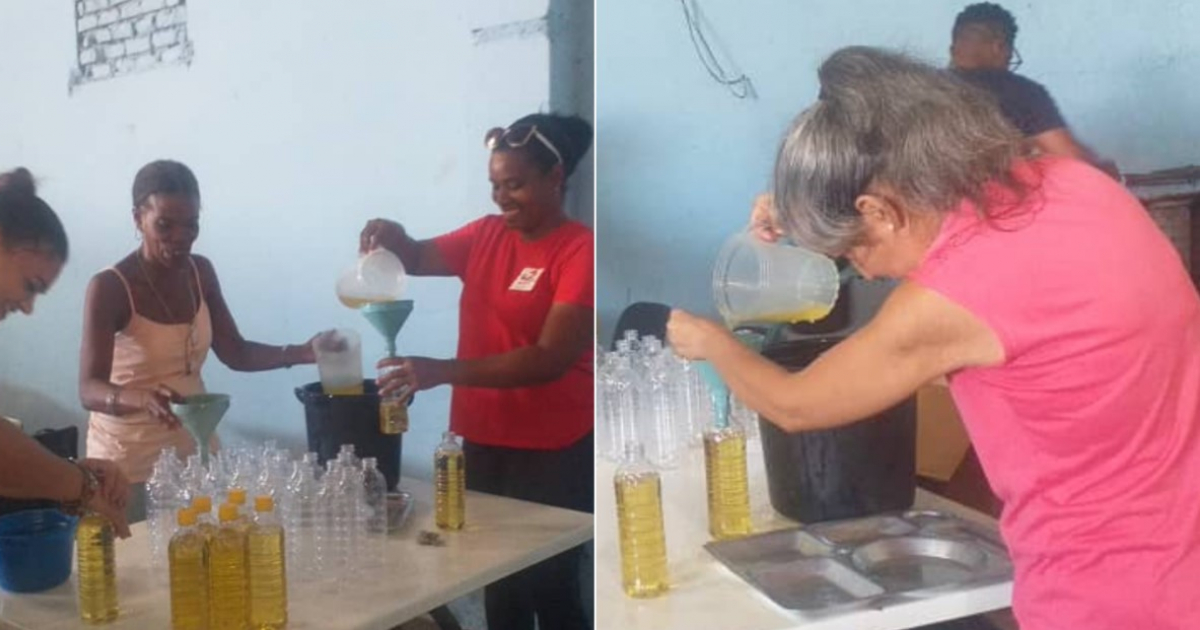Betsy Díaz Velázquez, the Minister of Domestic Trade, shared images on social media of the manual bottling process of cooking oil destined for Havana's ration stores, sparking widespread outrage.
Díaz posted on the social platform X, showcasing a group of workers from the Ministry of Domestic Trade (MINCIN) manually bottling oil using jugs and funnels, without adhering to any hygiene or food safety measures.
"MINCIN workers are involved in the bottling of oil for Havana's rationed family basket," the minister noted.
Public Outcry Over Unsafe Practices
In another post, Díaz explained that the oil bottling was part of a voluntary effort at the Havana Wholesale Food Products Company, aimed at packaging a portion of the oil for the rationed family basket.
The images showing manual oil bottling, blatantly ignoring hygienic standards, have caused significant indignation on the social platform X.
@VoltusVCuba commented: "At least five hygiene fines for each of them and expulsion for you, as it's clear you have no idea how to handle food safely. Minister, they say... Feeding pigs, the order is given. Disgusting, I don't want oil anymore; I might fry a hair."
User @KipsineO remarked: "A minister showing how Cuba 'advances.' That photo is a poem to misery without even touching on hygiene issues. What a disaster Cuba is, in one picture."
"Without face masks, laughing and talking over the product. Do they even know about food safety?" noted @andy_sv1986.
This sentiment was echoed by @eulogiosorio, who pointed out, "And yet, Canel still talks about food safety and circular economy, blah, blah, blah."
Meanwhile, @Blancoy48488239 expressed: "Normalizing communist misery, you should be ashamed of such filth."
"In any other part of the world, you'd be in jail for this, but you're so clueless you don't even realize," said @ReinaldoEchev11.
"Betsy, delete the post before you get a late-night call telling you you're off the air like Bejarano," mocked user @Camaguey1514.
Ongoing Distribution Issues
Recently, the Cuban government confirmed the persistent disruptions in the distribution of rationed food products sold to its population, which have been incomplete or delayed for years.
"2023 ended with shortages in beans, sugar, oil, coffee, chicken, meat products, eggs, and domestic fuels, which continued into the first quarter of 2024," reported the official digital site Cubadebate, which detailed the MINCIN's "accountability" before the National Assembly of People's Power.
Complaints about delays and shortages in the rationed basket continue to flood social media.
It is worth recalling that in early July, residents of Holguín finally received the missing rice the government owed them from June. A similar situation occurred throughout the eastern part of the island.
Since 2022, reliance on imports has increased to ensure these products, due to the decline in national production of rice, beans, eggs, milk, and other foods.
Frequently Asked Questions about Cuba's Ration System
Given the ongoing public concern and the recent controversy, here are some frequently asked questions about Cuba's ration system and the issues surrounding it.
What sparked the outrage over the manual oil bottling process?
The outrage was sparked by images showing MINCIN workers manually bottling oil without following any hygiene or food safety protocols, which were shared by Minister Betsy Díaz Velázquez.
What products have been affected by distribution issues in Cuba?
Products such as beans, sugar, oil, coffee, chicken, meat products, eggs, and domestic fuels have been affected by distribution issues in Cuba.
How has the Cuban government addressed these distribution problems?
The Cuban government has acknowledged the ongoing issues but has struggled to resolve them due to increased reliance on imports and decreased national production.
